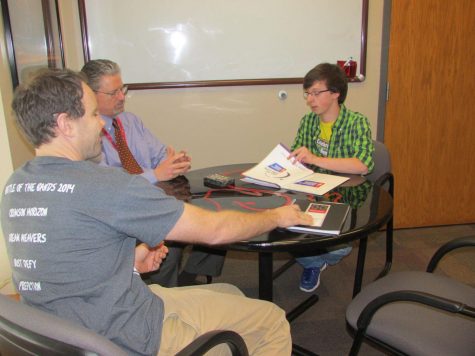Students take up the stock trading game in Economics
December 10, 2013
Stock trading allows for the expansion of personal wealth. However, if the trader isn’t careful, their money could disappear quickly.
The economic classes have recently been participating in a virtual stock trading game. Each student is given 20,000 virtual dollars that they need to invest into stocks. The students are not only investing, but learning the techniques and tricks to trading stocks.
Social Studies teachers Mike Weiss and Michael Puhrmann both teach economic classes, both of which participate in the stock market trading game. Each teacher sets their games up a little differently. In Weiss’s stock trading game students are not allowed to buy stocks under a dollar; however, in Puhrmann’s game the students are allowed to buy stocks with no constraints.
Even though the rules may be different the overall objective of the games in both classrooms remains the same, “1- Don’t lose money, 2- Never forget 1,” said Weiss.
The virtual trading game is teaching the students the ways of a stock broker and the work that goes into deciding whether to purchase a stock or to not purchase a stock. When asked what life lessons can be learned from participating in the game Weiss said, “the importance of researching a company before deciding to invest in that company.”
The stock market game shows the students the risks and rewards that comes with investing their money. The investor can simply invest their money into a long term stock or buy stocks low and sell them high; however, there are always certain risks involved.
Sharon Calhoun a financial adviser for Vector Wealth Management talked about the psychology of stock trading, Calhoun said. “People know to ‘buy low, sell high’, but the fact is, most don’t! Often times they buy when the stock has had a run up, but then don’t want to sell when it’s at an all time high.”
The overall objective of the game is to not only to make as much money as possible, but also to acquire knowledge about the stock trading market. Puhrmann said, “To understand the importance of compounding interest and the benefits of long term investing.”
The economic classrooms are now filled with stock brokers and investors. The stock trading game is teaching the students valuable assets that they will be able to put forward later in life no matter what field of work they are in. 52 pecent of adult Americans invest their money into stock; hopefully, through the skills learned in the virtual stock trading game Stillwater graduates will invest their money wisely.











Alex Weil • Jan 13, 2014 at 3:59 am
great article good use of facts, and good idea to utilize a source outside of the ecnomics department.
Travis Johnson • Jan 12, 2014 at 10:35 pm
Nice job Matt. The quotes you got were substantial and made sense. which is often a problem in newspapers. You did a good job explaining how the virtual game works, for the people who don’t know anything about it. Overall, this article is well written and doesn’t have much “filler”, which makes it a much better read.